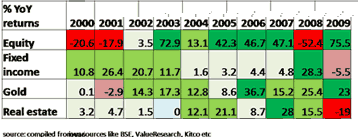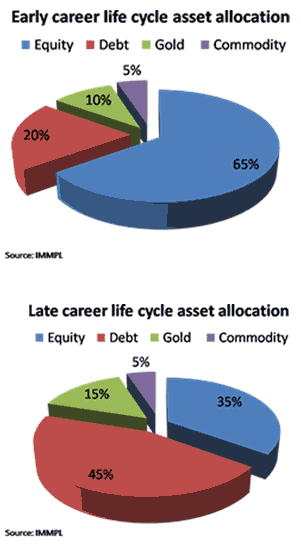
The topic of asset allocation has been discussed over the past 18 months with a high degree of intensity across forums (including the media) and rightly so. Globally and more particularly, from an Indian context, there has not been a time over the past 15 years or so when investors, advisors and money managers have been in a dilemma almost every single day trying to get a handle of almost each asset class and the likely future direction, be it short term or medium term.
The asset market's (equity, debt and commodities) performance in the recent past, on the back of global turmoil that started in late-2007, has had investors turn to their financial advisors for help in understanding this phenomenon, advice on the way forward and more importantly the impact on his/her goals and priorities during this period of higher volatility and uncertainty.
Advisors on the other hand have had their share of woes coinciding with this period of increased pressure as a result of paradigm shift in business model due to change in regulations. This coupled with higher asset market volatility has shrunk business volumes thereby putting advisors working more hard to retain similar, if not lesser revenues than was the case during 2003-2007 period.
Click NEXT to read on about what exactly 'asset allocation' is...

Asset allocation simply means spreading investor wealth over different asset classes for various reasons including:
From an Indian context, every individual knowingly or otherwise does practice asset allocation; though the process might not be as planned as it should and not very scientific. This often leads to significant positive or negative implications which are a result of changing market conditions.
For instance individuals heavily invested in real estate could accumulate wealth over time, however could suffer from severe liquidity crises at times leading to distress sales of such assets. Similarly, heavy reliance on equities or debt could have implications of losses or low returns respectively.
A more methodical and balanced approach to all asset classes depending upon individual risk appetite is amongst the best way to create long-term wealth.

There has never been a time in the past where importance of the idea of asset allocation needed such strong emphasis as now and more importantly the notion of rigorous implementation seems to be stronger than ever. Bear in mind that any advisor's success of communication and proposition of asset allocation to the investor in only 25 per cent of the battle.
The ability to implement it fully, going against apparent conventional wisdom while making investments and persisting with the strategy once implemented are all battles that form the other 75 per cent of the job. This in itself is akin to fighting a mini war of sorts.
The chart alongside depicts how various broad asset classes have performed in India over the last decade and it must be noted that an investor who stuck on to his asset allocation without applying too much thought over timing and remaining unemotional throughout has definitely made more money than otherwise.

The typical asset allocation for an earning individual who is early on in his career should vis-a-vis an individual who is late in his career life cycle is laid out in the image alongside. One should, however, understand that since every individual is unique and more importantly each individual's risk appetite and goals in life vary, so will his asset allocation.
Therefore it is only prudent that one consults his/her financial advisor before setting and implementing the asset allocation strategy. The same would also be subject to periodic review and change depending upon any material change to situations under which it was planned.